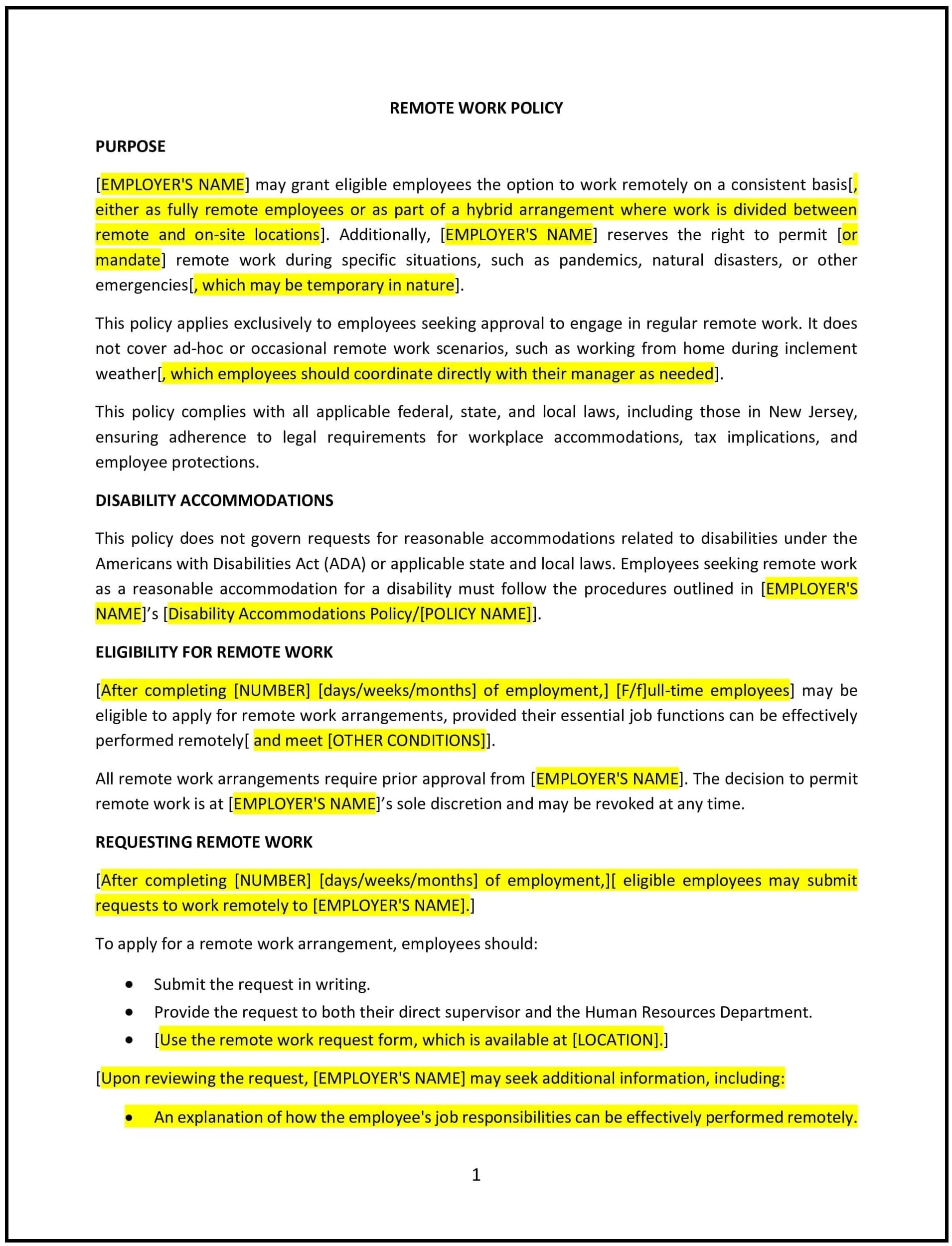Got contracts to review? While you're here for policies, let Cobrief make contract review effortless—start your free review now.

Customize this template for free
Remote work policy (New Jersey)
A remote work policy helps New Jersey businesses establish clear guidelines for employees working outside of the office, whether from home or another location. This policy outlines eligibility, expectations for productivity, communication, security, and equipment usage while working remotely. It also addresses how remote work integrates with company culture and any requirements for in-office attendance or collaboration.
By adopting this policy, businesses in New Jersey can offer flexibility, improve work-life balance, and maintain operational efficiency while ensuring that remote work arrangements align with company goals.
How to use this remote work policy (New Jersey)
- Define eligibility criteria: Specify which employees are eligible for remote work, such as full-time employees, specific roles, or after a probationary period.
- Set expectations for productivity: Establish clear performance expectations, such as deliverables, timelines, and key performance indicators (KPIs), to ensure remote employees meet the same standards as those working in the office.
- Outline communication guidelines: Specify how remote employees should communicate with colleagues and managers, including tools for messaging, video conferencing, and scheduling regular check-ins.
- Address equipment and technology: Define the technology, equipment, and software employees are expected to use while working remotely, and clarify any support the company provides for these tools.
- Provide security requirements: Set guidelines for maintaining data privacy and security while working remotely, such as using VPNs, secure Wi-Fi networks, and company-approved devices.
- Set boundaries for work hours: Clarify working hours, including the expectation to be available during core hours, and the flexibility allowed for adjusting schedules.
- Encourage work-life balance: Support employees in managing their work and personal life by setting clear boundaries for working hours and respecting personal time.
- Review and update: Regularly assess the policy to ensure it aligns with evolving company practices, New Jersey employment laws, and the needs of remote workers.
Benefits of using this remote work policy (New Jersey)
This policy provides several benefits for New Jersey businesses:
- Increases flexibility: Offers employees greater control over their work environment, improving job satisfaction and work-life balance.
- Enhances productivity: Clearly defined expectations and accountability for remote work help maintain high performance and efficiency.
- Reduces operational costs: Minimizes expenses associated with office space, utilities, and other on-site resources.
- Attracts top talent: Demonstrates the company’s commitment to flexible work arrangements, which can help attract and retain skilled employees.
- Strengthens security: Establishes protocols for ensuring that sensitive company data and information remain secure while employees work remotely.
Tips for using this remote work policy (New Jersey)
- Communicate the policy clearly: Ensure all employees understand the expectations and guidelines for working remotely, including performance metrics and communication protocols.
- Provide the necessary tools: Ensure that employees have access to the technology, software, and resources needed to work effectively from home.
- Monitor and assess performance: Regularly check in with remote employees to track progress, offer feedback, and ensure that goals are being met.
- Encourage open communication: Foster a transparent and open environment where remote employees feel comfortable sharing concerns and suggestions.
- Review the policy regularly: Update the policy to reflect changes in technology, business needs, or New Jersey regulations regarding remote work.